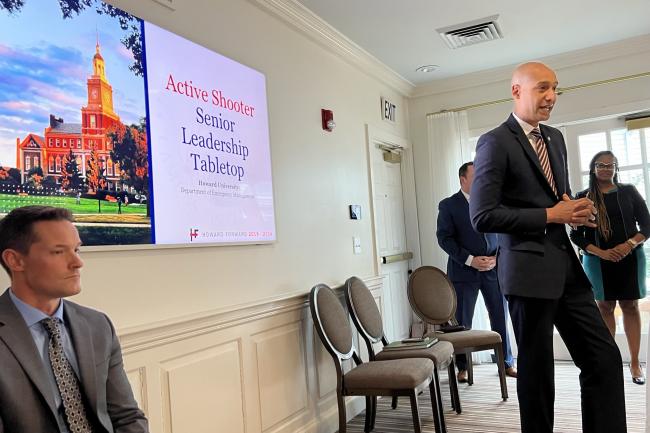By Jarrett Carter
Days after the release of video footage detailing the gruesome January beating of Memphis resident Tyre Nichols at the hands of city police officers, Marcus Lyles knew that Howard University community members needed healing and perspective. Like many police officials in major cities nationwide, he knew that the campus community had to brace for potential unrest and protests of Nichols’ murder.
“It was the worst I’d ever seen,” says Lyles, who has served as executive director of public safety and chief of police at Howard University since 2018. “And given our community’s sensitivity to fair treatment in policing and eliminating police violence, it was a moment that I knew we had to take the lead.”
Lyles penned a letter to the campus community praising Howard students and employees as a model of community policing at its best. Partnership, he wrote, was the only remedy for resource-challenged public safety departments and communities harmed by horror stories of disproportionate force in policing.
“We are not blind to what a badge and a uniform mean to many people in our communities, and understandably so,” he wrote. “For those who may be continuing to battle against the images and pain associated with the tragedy in Memphis and others like it, we hope that you will take advantage of our resources for counseling and therapy. We cannot tolerate mayhem delivered under false coverings of peacekeeping tactics. Extreme violence in policing must end, and confidence must be rebuilt among our neighbors about the benefit of well-funded, well-trained, and expertly-led police departments nationwide.”
The outreach was not a first for Lyles, who regularly writes to Howard stakeholders about policing and safety issues close to home and beyond. That outreach is a driver behind Lyles’ being named as a finalist for Campus Safety Magazine’s ‘Public Safety Executive of the Year,’ which will be awarded next month in Las Vegas. Lyles leads a growing department that, since 2020, has decreased on-campus crime statistics by more than 30% despite the simultaneous increase of crime in the areas surrounding campus.
We want our community members to feel empowered to protect themselves and others,”
Working with Howard President Wayne A.I. Frederick and Executive Vice President and Chief Operating Officer Tashni Dubroy, Lyles has upgraded campuswide safety infrastructures with more than 600 new security cameras and access control locks for academic and residential facilities.
HUDPS has led initiatives for the campus community to download and use mobile personal safety devices like the Bison S.A.F.E. mobile app and Peace of Mind devices as mobile blue lights. These provide students, faculty, and staff with discreet, instant connection to campus police without making a phone call.
“We want our community members to feel empowered to protect themselves and others,” Lyles says. “That means being innovative in how we can report and detail suspected or actual actions that can negatively impact our neighbors. Their engagement gives us great latitude in safety response and investigation, and it makes a difference when we go out to present to campus groups about our University safety culture.”
Safety, Lyles says, is more than just prevention and protection from crime, but also the opportunities that a college campus can provide its stakeholders on safety issues. HUDPS hosts an annual safety fair where hiring leaders from municipal and federal safety agencies recruit for internships and jobs. Last September, the department partnered with the Federal Emergency Management Agency (FEMA) to launch its annual National Preparedness Month, a campaign to raise community awareness of natural disasters and how to prevent loss of life.
Last month, the U.S. Department of Education HUDPS awarded the department a $203,000 federal grant to emphasize mental health and case coordination support in emergency management. The department will use the funding to hire officials dedicated to wellness visits and service coordination for stakeholders impacted by violence, and a full-time emergency management training expert dedicated to campus readiness in active threat and crisis scenarios.
Howard is one of four historically Black institutions to receive more than $1 million in the latest round of funding under the Project School Emergency Response to Violence (SERV) initiative, a response to bombing threats made against HBCUs over the last 16 months and eight made explicitly against the University, the most of any institution.
A native of Washington, D.C., Lyles’ work has earned him national acclaim. He is a two-time winner of the ‘Director of the Year’ award from the Historically Black College and University Law Enforcement Executives and Administrators organization. Being named as a finalist for this award, Lyles says, honors the men and women of the department who dedicate their lives to service.
“That’s the most rewarding part of this job and this opportunity for our entire department to be recognized.”

